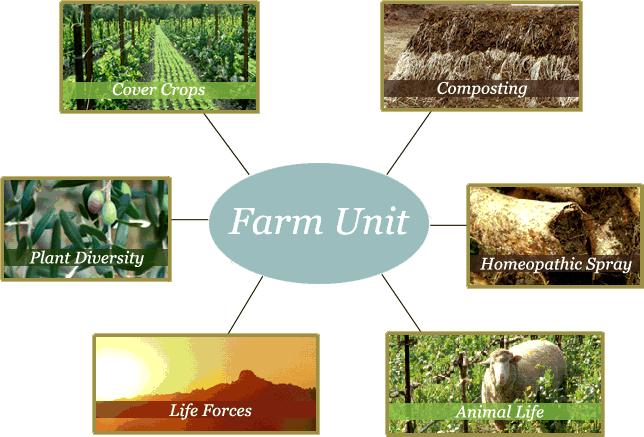Biodynamic agriculture, or biodynamics, comprises an ecological and sustainable farming system, that includes many of the ideas of organic farming (but predates the term). In 1924, a group of farmers concerned about the future of agriculture requested Steiner's help; Steiner responded with a lecture series on agriculture. This was the origin of biodynamic agriculture, which is now practiced throughout much of Europe, North America, and Australasia.
A central concept of these lectures was to "individualize" the farm by bringing no or few outside materials onto the farm, but producing all needed materials such as manure and animal feed from within what he called the "farm organism".

Other aspects of biodynamic farming inspired by Steiner's lectures include timing activities such as planting in relation to the movement patterns of the moon and planets and applying "preparations", which consist of natural materials which have been processed in specific ways, to soil, compost piles, and plants with the intention of engaging non-physical beings and elemental forces. Steiner, in his lectures, encouraged his listeners to verify his suggestions scientifically, as he had not yet done.
The early decades of the twentieth-century agriculture started using inorganic fertilizers such as nitrogen "condensed" from the air and subsequently applied to the fields. Steiner believed that the introduction of this chemical farming was a very detrimental. Stating "Mineral manuring is a thing that must cease altogether in time, for the effect of every kind of mineral manure, after a time, is that the products grown on the fields thus treated lose their nutritive value. It is an absolutely general law."
Steiner was convinced that the quality of food in his time had degraded, and he believed the source of the problem was chemical farming's use of artificial fertilizers and pesticides, however he did not believe this was only because of the chemical or biological properties relating to the substances involved, but also due to spiritual shortcomings in the whole chemical approach to farming. Steiner considered the world and everything in it as simultaneously spiritual and material in nature, an approach termed monism. He also believed that living matter was different from dead matter. In other words, Steiner believed synthetic nutrients were not the same as their more living counterparts.
The name "biologically dynamic" or "biodynamic" was coined by Steiner's adherents. A central aspect of biodynamics is that the farm as a whole is seen as an organism, and therefore should be a closed self-nourishing system, which the preparations nourish. Disease of organisms is not to be tackled in isolation but is a symptom of problems in the whole organism.
Biodynamic farming has had a significant influence on agriculture in many countries around the world, including Germany, Switzerland, England, Canada, Australia, India, South Africa and the United States. Being a step above organics, it is possibly the only practice that the modern world can put into place that will truly save the planet.
The basic premise of biodynamic agriculture puts all efforts of the farmer into creating, nurturing, and building healthy soil that has "vitality" meaning that it is "alive". The soil becomes the source of food or nutrition for plants, trees, and micro-organisms, which in turn feed the animals, release oxygen into the air and not only sustain, but strengthen the life cycles, ecosystems, and enhance all life on our planet, bringing true "vitality" back to the planet.
|